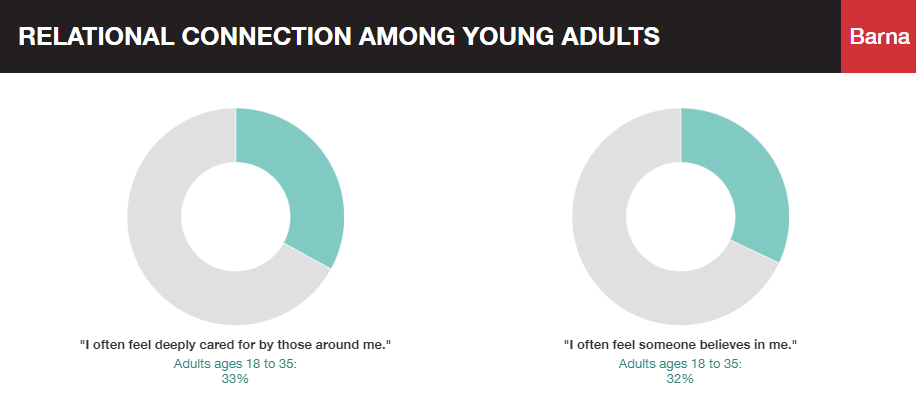Let that sink in if you are a parent, guardian, sibling, or friend of young people. One million people leave the church and give Jesus their hand yearly.
According to a study by the Pinetops Foundation and TenX10, if that exodus of Millennials, Generation Z, and most likely the Generation Alphas coming up, there will be 35 million people “disaffiliating” with the Church by 2050.
We are at a critical point in time. The next 30 years will offer the largest mission opportunity in the history of the American church.
TenX10
People are leaving the Church at an alarming rate. Moreover, they are denying the work of God in their lives. What do they experience forcing them from fellowship or learning more about God’s love? Is it something in the church or the people who invite them to it?
Whatever the case, they’re leaving and staying away. “The largest mission opportunity” is an understatement, considering the state of mental health and emotional loss we live with today.
What’s your mission? Before answering the what, let’s examine why young people tell Jesus, “I’m good.” Point of order: “Mission” doesn’t only mean across an ocean; it can also mean across the street.
It seems we all have something to do.
Why is the Fountain of Youth Drying Up in the Church?

Based on the study’s findings, the next three decades are crucial to the Church.
The American church needs to plant more than 215,000 churches in the next 30 years to maintain the status quo and to meet the needs of the unaffiliated an additional 60,000 churches.
Regretfully, this is not a surprise result of a national study—only a terrifying reinforcing one. As early as 2016, the writing was on the wall about Millennials being “less religious” than anyone else. The reason at the time was a severe lack of trust.
For one thing, a long list of scandals in recent decades, such as Watergate, have undone the reputations of major institutions the Greatest Generation trusted. Millennials didn’t grow up trusting these institutions and then had that trust betrayed like older Americans might have. They didn’t trust them to begin with. And these institutions have let people, particularly young people, down.
Pew Research, 2016
In 2019, a headline read: “Gen Z is the least religious generation.” An even more serious lack of trust than their predecessors, Generation Z was “more likely to identify as atheist or agnostic–21% vs. 15%” and “most think church attendance is unimportant.”
This is a distressing note considering evangelism because people born between 1997-2012 are among the most ethnically, racially, and religiously diverse U.S. generation. Their emotions run hot, and their opinions run hotter. From polarizing thoughts to even more divisive actions, an entire generation believes God is not their priority.
He possibly doesn’t even rank in their Top 10.
More than any other generation, young people today have access to information about alternative views. All you ever wanted to know about Buddhism or Islam is only a click away, and there’s evidence the Internet has helped young atheists who live in religiously conservative communities find like-minded youth.
Pew Research, 2019
Religion, most importantly, Christianity, is viewed as a problem–not a solution.
What’s the Answer to Reaching Young People

The numbers don’t lie, and they have been consistent for over a decade. Young people are leaving the Church, regardless of denomination, because of something the local church doesn’t provide and many things they deem hypocritical outside of it.
What’s the answer? Should we create more small groups or school groups? Is there a need for more churches to welcome the lost? The reason may be “close to home,” but whatever the reason, Christians hold some of the blame and we need to do better.
If you’re serious about making a change to help God reach these young people, here are a few ways how:
1. Create an Experience Unavailable Online

Get these statistics from Barna and Pew Research:
- Over 93% of young people use social media daily –37 million people
- Nearly 70% of those have what would qualify as a “social media addiction”
- The national average plugged into social media is 1 hour and 40 minutes a day
The online church service must be action-packed and compelling. The thought is to get the young person in person, but if statistics continue, that’s not happening. So, create exclusive content that is not available to an online audience.
It’s called “FOMO” (Fear of Missing Out), and 86% of all young people experience FOMO when not on social media. Reverse that! This is what they’re missing by not being [here at church] by not being here.
If they stay online, their relationship is with the activity on stage. But if they visit the church, their relationships are with real people who can impact their lives.
2. They’re Not “Youth.” They are “Young Adults.”
There is a fine line between a sincere and authentic pastor of young adults, and as my son would say, “being a Try Hard.” Essentially, that’s a 55-year-old person trying to be hip on stage talking to young adults using text lingo and whatever else they could find in the “Urban Dictionary.”
That’s not what young people want. Barna researched adults ages 18-35 about their relational connection with adults–this includes young adult pastors. They aren’t looking for hip-talk and a guy wearing Vans.

No one wants to be called “fake.” No one in ministry whose heart is focused on God is fake. However, perception is a powerful thing among young people. The numbers are there — they want to feel real and authentic care from the person they see online or the person on the stage. It’s difficult to experience authentic trust and belief online, so that should be said from the stage.
Talk to them. Create that FOMO. Make them want that connection, but force them to get it in person.
3. Be All Things to All People

That’s the one striking thing about Jesus during His time on Earth—He never met a person who felt like they weren’t good enough to be in His presence. Sure, shame may have made them uncertain, but give it a minute, and the love of Jesus overpowers that.
Here’s a note: If you want people to return to the building, help them stay close to the one who can greet them in their home.
You’re no more than a conduit, Pastor. What they see online should be the open door to what can be experienced in person. Broadcast a small group on Twitch. Show them the happiness that could be experienced in person.
Authentic fun. Corporate emotion. Mutual happiness. But above all, individual benefit.
Gone are the “Field of Dreams” days of “If you build it, they will come.” Open the door for your young people group, and no one shows up. Why? They don’t know they’re invited.
Am I welcome there? But they don’t know what I’ve been through? They look happy at the church service, and I am not. Social media and video should only be a glimpse into what will come. It’s not a direct reflection. Young people are missing something by not being there.
Yet, they only believe that if you show and tell them that. Online access is not in-person; it’s only the open door. Throw out the welcome mat with your authentic selves and watch what happens!













